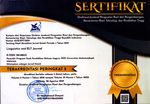Social Class and Class Struggle in The Hunger Games (2012) Movie
Abstract
Keywords
Full Text:
PDFReferences
V. I. Lenin and K. Marx, “The Marxist Doctrine,” 2020.
K. Marx and F. Engels, “Manifesto of the Communist Party and its genesis”.
D. Cronshaw, “Resisting the Empire in Young Adult Fiction: Lessons from Hunger Games,” International Journal of Public Theology, vol. 13, no. 2, pp. 119–139, Jul. 2019, doi: 10.1163/15697320-12341568.
R. Nyman, “The Hunger Games as Dystopian Fiction,” 2015.
A. Ramadhani, . E., and V. Yusraini, “Representation of Classes Based on the Hunger Games’ Trilogy By Suzanne Collins On Marxism Perspective,” Abstract of Undergraduate Research, Faculty of Humanities, Bung Hatta University, vol. 2, no. 2, Jun. 2016, Accessed: Feb. 25, 2025. [Online]. Available: https://ejurnal.bunghatta.ac.id/index.php/JFIB/article/view/8903
J. W. Creswell and C. N. Poth, Qualitative inquiry and research design: Choosing among five approaches. Sage publications, 2016.
S. Ahmad, “Determination of Socio-economic Conditions through Wealth and Material Possessions: A Marxist Critique of Mansfield’s Doll’s House”.
W. J. Benet, “Rethinking Authority and Hierarchy in a Learning Society,” 2003.
G. Casuso, “The epistemic foundations of injustice: lessons from the Young Marx,” Humanit Soc Sci Commun, vol. 8, no. 1, pp. 1–10, Dec. 2021, doi: 10.1057/S41599-021-00813-X;SUBJMETA=4007,4014,438,523;KWRD=Philosophy,Sociology.
M. F. Thahir, F. Rahman, and M. Makka, “The Reflection of The Global Capitalism System in Suzanne Collins’s The Hunger Games,” Jurnal Ilmu Budaya, vol. 6, no. 1, Jun. 2018, doi: 10.34050/JIB.V6I1.4302.
N. Crossley, “Class Consciousness: The Marxist Conception,” The Wiley-Blackwell Encyclopedia of Social and Political Movements, Jan. 2013, doi: 10.1002/9780470674871.WBESPM028.
DOI: https://doi.org/10.31764/leltj.v13i1.31286
Refbacks
- There are currently no refbacks.
Copyright (c) 2025 Fahmi Haidar Al kahfi

This work is licensed under a Creative Commons Attribution-ShareAlike 4.0 International License.
_____________________________________________________
Linguistics and ELT Journal
p-ISSN 2339-2940 | e-ISSN 2614-8633

LELTJ is licensed under a Creative Commons Attribution-ShareAlike 4.0 International License.
_____________________________________________________
LELTJ is abstracting & indexing in the following databases:
_____________________________________________________
LELTJ Editorial Office:













